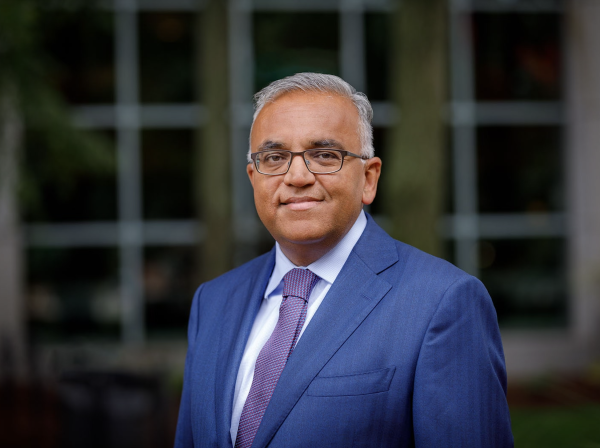The former White House COVID-19 response coordinator discussed his lessons from the pandemic and his work in public health policy with students in a Jan. 30 global health class.
Ashish Jha, who was appointed by President Joe Biden as COVID-19 response coordinator in April 2022, joined Georgetown University students in a class called “Conversations in Health: Global to Local,” a one-credit course the university offers to allow global health students to engage with leaders in the field. The course is led by John Monahan, a professor in the department of medicine, a senior advisor for global health to Georgetown University President John J. DeGioia (CAS ’79, GRD ’95), a senior fellow at the McCourt School of Public Policy and a senior scholar at the O’Neill Institute for National and Global Health Law at Georgetown Law.
Jha was born in India before eventually moving to Canada when he was nine years old. He moved to the United States to attend high school in New Jersey.
Jha studied economics on the premedical track at Columbia University, where he began to get involved in human rights efforts on campus.
“At Columbia, I got super interested in human rights and ran the human rights organization there for several years,” Jha said. “I got interested in thinking about how to make change.”
Jha began the talk by discussing how his background shaped his interest in medicine. His parents pushed him to become a doctor and he followed their advice, graduating from Harvard Medical School.
Although Jha said he initially entered medical school to placate his parents, he said he ultimately found his profession to be incredibly fulfilling.

“I am now old enough that I can just go ahead and admit it: I went to medical school for all the reasons you aren’t supposed to go to medical school. I went to medical school because my parents really wanted me to go to medical school,” Jha said in the class. “I ended up loving medical school and can’t think of a career that would have made me happier.”
Jha said his interest in public health grew when, as a student at Harvard, he began thinking about combining medicine with policy to have a greater impact in solving health issues across the United States and took classes at public health school.
“It was pretty clear to me that you would see people in clinic as a second or third year student and you had a sense that you were sort of patching up and putting Band-Aids on these massive problems people had in their lives,” Jha said. “Moving people’s lives in the right direction really required a much broader set of thinking than what I could do from a hospital. I think that was sort of the beginning of my interest in public health.”
Jha, who took time off from practicing medicine, said that he plans to return to medicine after leaving the White House in June of last year. He said his clinical perspective gives him the chance to better understand policy decisions.
“I do a lot of work thinking about healthcare equality, cost and structure of systems and thinking about long term care and how it should be organized,” Jha said. “I could have a patient in the hospital that I am trying to get to a nursing home and I can’t. And I’m like, ‘Oh, yeah, this is where the rubber meets the road on policy.’ It grounds my thinking about policy and makes it real.”
In March 2020, during the initial COVID-19 response of President Donald Trump’s administration, Jha became an advisor to nearly a dozen states. He said he provided guidance to these state’s governors about how to respond to the pandemic, as they felt overwhelmed about how to respond to the unprecedented situation.
“During 2020, what happened was there was, in many ways, a collapse of the federal government’s response to the pandemic,” Jha said. “Governors felt totally lost and couldn’t get advice from anybody in the federal government.”
Jha said he began speaking with them multiple times a week to give his recommendations — some of which the governors implemented, but others of which they rejected. Jha said he realized this wasn’t a reflection of him personally and reminded him of the significant role politics play in a public health response.
“I reminded myself that no one elected me anything. I was not the governor of that state. I had zero accountability to the people of that state. And if I screwed up, no one could hold me accountable,” Jha said. “Science has got to be part of the conversation, but it can’t be the final driver. We are in a way too complex of a society.”
Jha said that when he joined the White House in April 2022, he had been critical of how both the Biden and Trump administrations had dealt with the pandemic – but when he assumed the role of COVID-19 response coordinator, he realized the political nature of his task.
“You won’t be surprised that the COVID response coordinator at the White House is not the final decider on everything,” Jha said. “There are times when the people above you, particularly the staff or the president, want to go in a different direction.”
“What you realize is they are playing a different game,” Jha added. “I am there to deal with COVID, they are there to run a country. That is how democracies work.”
Following the moderator’s questions, Jha answered questions from the students in the class. Students inquired about Jha’s perspective on Americans’ lack of trust in the U.S. public health system and how to best move forward.
Jha said the public’s trust is often broken as a result of the mistakes made by public health officials or due to various people overemphasizing these mistakes.
“There are a lot of people who use every misstep of public health to undermine confidence in public health. There’s a lot of bad actors,” Jha said. “I also think there have been a lot of missteps.”
Jha went on to say that the public health community needs to do better, and he has tried to call himself out when he was wrong on a particular topic.
Jha concluded by speaking to students about how to prepare future public health leaders for the intersection between health, policy and emotional preparedness.
“We do not teach people about the political economy enough. You cannot just wave a magic wand and have the magical public health system,” Jha said. “First of all, there is no such thing. And second, the public health system absolutely has to be contextualized within the political time of what is possible.”









